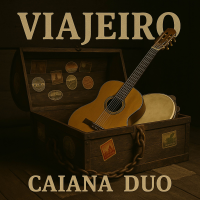Home » Jazz Articles » Interview » Chuck Redd: 40 Years On the Road
Chuck Redd: 40 Years On the Road
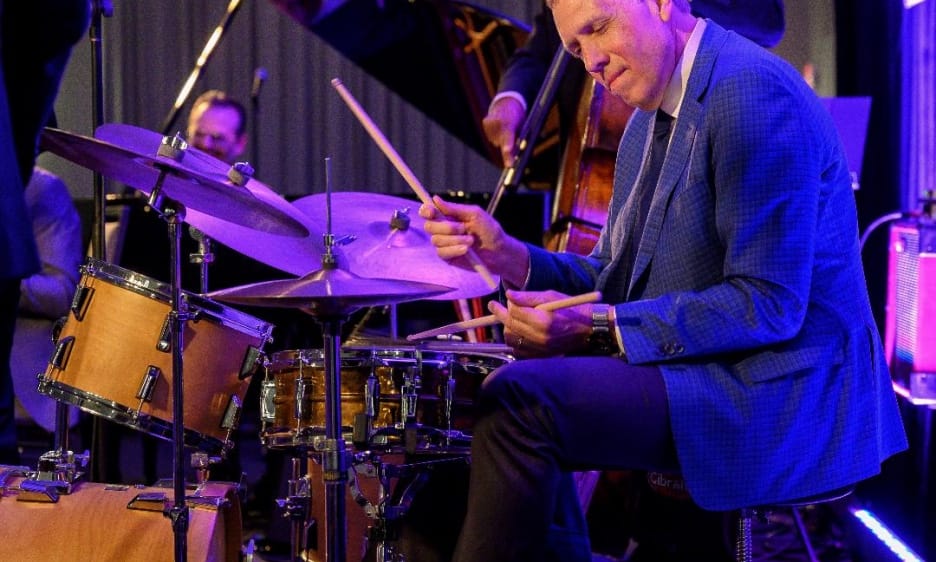
That feeling is in our music, it's in America, it's strong and powerful and even if you grew up listening to R&B, rock or country music that thread runs through there and it's beautiful.
—Chuck Redd
Chuck Redd
vibraphone
Nate Najar
guitar, acousticb.1981

John Pizzarelli
guitarb.1960

Steve Masakowski
guitarb.1954
All About Jazz: This is quite a milestone celebrating 40 years on the road. So, let's go back to the beginning, what did you start out playing?
Chuck Redd: Drums! There was never a time I could not imagine not playing the drums. I remember being 5 or 6 years years old just wanting to bang on something. My father would play records and I was always aware of the drummers. I would listen to what Ringo [Starr] did on the Beatle albums and finally, at about 10 years old, I got a great teacher,
John Otto Richardson
b.1932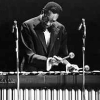
Milt Jackson
vibraphone1923 - 1999
AAJ: Did either of your parents play?
CR: When my father was in college he played amateur saxophone, my mother never played. She loved and still loves music and at 93 years old she goes out to hear music whenever she can. She, Delphine, has even been with me here at the North Carolina Jazz Festival a couple of times. Anyway, there was a lot of great music and great jazz in the house. My brother Robert is a wonderful pianist with the Ellington band.
AAJ: Where you in a band in high school or in the high school band?
CR: Oh yes, I was in the high school stage, concert and marching bands. I was very serious about my drumming and while attending Montgomery Community College, which had an outstanding music department, I encountered a gentleman who became one of my first big musical mentors,
Bill Potts
b.1928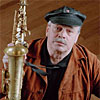
Phil Woods
saxophone, alto1931 - 2015

Zoot Sims
saxophone, tenor1925 - 1985

Ernie Wilkins
arranger1922 - 1999

Clark Terry
trumpet1920 - 2015

Charlie Byrd
guitar1925 - 1999
AAJ: So you were playing local gigs around DC?
CR: Yes, I was playing with big bands, dance bands, there were a lot of big bands in Washington in the '70s and I was playing with a handful of those plus I played with Bill Potts big band which was a concert band, but we also played some clubs like Blues Alley. We did an album plus I was playing with a lot of jazz players around DC. I was 18, 19 years old.
AAJ: So on Bill Pott's recommendation Charlie Byrd calls you. Did you have to audition for him?
CR: No, when I was sitting in with him I didn't realize I was auditioning. I'm 17 years old and Charlie let me sit in with him for around 2 years and I guess he heard me getting better and better. My parents had all his recordings which I continually listened to so I learned all the arrangements and he must have liked what I was doing because he called me and asked to sub for a whole evening. This was in 1979 and I thought this was going to be the highlight of my career and after the gig Charlie pulled me aside and told me if he was looking for a drummer he wouldn't hesitate to hire me. Again, this was another highlight for me. Now, I didn't realize it but Charlie was getting ready to fire his drummer and a couple of months later I get a call from his manager asking me to go on tour with him. That was the beginning of a 19-year association with Charlie Byrd. I still did other things, I played with

Mel Torme
vocals1925 - 1999

Ken Peplowski
woodwindsb.1959
AAJ: Did you play vibes in Charlie's band?
CR: I did eventually. For the first 10 years I was with him, 1980 to 1990, it was pretty much exclusively drums but he knew I was playing vibes around DC and he said I should bring them one night. We were in Annapolis playing a gig and he told me to play a couple of numbers at the end of the evening on vibes. So, I did and he said why don't I bring them back next week. I did, then some weeks later he told me why don't I leave the drums at home and we'll try it just the vibes. A couple of years before he told me he really didn't like vibes because he didn't think you could get a good sense of dynamics and proper phrasing on it. His instrument was so delicate, a nylon string guitar, he wasn't sure about the mix but because I knew his music so well, touring for 10 years, I kind of knew instinctively when to stay out of the way and when to jump in and play something that would enhance the sound of the group. As he got older I think he really liked having another soloist so he didn't have to work quite as hard. It was the perfect time to introduce the vibes into the

Charlie Byrd
guitar1925 - 1999
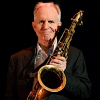
Scott Hamilton
saxophone, tenorb.1954
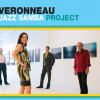 "
data-original-title="" title="">Joe Byrd on bass and one I did with Ken Peplowski the title I can't remember.
"
data-original-title="" title="">Joe Byrd on bass and one I did with Ken Peplowski the title I can't remember. AAJ: Was that your intro to Brazilian music?
CR: I'd say so. Charlie and also listening to people like

Sergio Mendes
piano1941 - 2024

Airto Moreira
percussionb.1941

Tania Maria
pianob.1948

Monty Alexander
pianob.1944

Duduka Da Fonseca
drumsAAJ: So it's 1980, you're 21 and hitting the road with Charlie Byrd. What was that like?
CR: It was the most exciting thing in the world, I knew my life had changed! I was OK if this only lasted a month, a half year, whatever, at least I could say I did this. I was so thrilled that this lifted me up to other possibilities but Charlie could tell how happy I was early on and how well it was working out but he was leaving all options open to me. He told me, "I want you to know if you see me using other drummers at some point don't let that hurt your feelings, don't worry about anything. I might want to do some different things and I certainly don't want to get into this thing where you're my one and only drummer for 12 years like my last drummer." Well, I stayed for 19 years so I must have been doing something right. We had a very special, unspoken deep bond. I have to say in retrospect I didn't even know it was happening but other people observed it. In fact, the great harmonica player Hendrick Merkins, hired Charlie and me for a European tour and he noted that Charlie and I were like father and son. We were able to communicate without having to say too much which is really when I realized how special our bond was. Charlie was a real stoic guy, not a lot of bullshit, not a lot of small talk, really intelligent. He was a World War 2 vet and on his way back to the states on a troop ship he said all he had was the money he had won playing poker and his guitar and after surviving the war— many of his friends didn't— he vowed never to do anything again he didn't want to do. He lived up to that. He was a country boy from Chuckatuck, Virginia, who moved to New York at a young age and interacted with all the beboppers,

Charlie Parker
saxophone, alto1920 - 1955
AAJ: What a great way to be able to start your career with someone like that.
CR: Absolutely!
AAJ: With all these years of traveling back and forth across the country, did you or do you see a difference between a west coast and east coast audience?
CR: Not really. New York audiences have always been special. You never know who's going to be in the audience and just the presence of some luminaries raises the importance of the evening. I remember playing at the Vanguard with Charlie in about 1983 or 4 and I looked back at the bar and

Art Blakey
drums1919 - 1990

Stan Getz
saxophone, tenor1927 - 1991

Carol Kaye
bass, electricb.1935

Barney Kessel
guitar, electric1923 - 2004

Herb Ellis
guitar1921 - 2010
AAJ: How have those audiences changed over the years if at all?
CR: Yeah, they've gotten older! Actually, here's the thing and I think about this a lot. It can bring me down if I think of jazz audiences getting older and older and that's certainly something that many jazz events, including this festival and every festival I play, have to deal with. Everybody, the administrative people, the volunteers and producers are always grappling with that, how can we bring some younger people in? The festivals that don't address this just won't last. The audience keeps aging, they're loyal and wonderful and they come on canes, walkers and wheel chairs then suddenly they're not there and that's life, that's sad but that's the circle of life.
On the other hand, this festival and others, are doing everything they can to bring in young people. There are plenty of young people who love jazz and that swing feeling that we have cultivated and worked on and that groove that communicates with everyone. Last night it was such a joy to look out and see one of the young people I taught in my master class [the Friday afternoon of the jazz festival some of the musicians teach master classes to aspiring students]. This young kid, Conner, very talented on drums, piano, vibes and was very enthusiastic about all of it. We were playing a calypso tune and I mentioned Monty Alexander. Conner immediately pulled out his phone and looked up Monty on Spotify then he said, "By the way, you're on my playlist." It's so cool!
Here's the exciting thing, Sandy [Sandy Evans, President of the Board] invites all the master class students to the events. On the bandstand are a bunch of musicians, I'm 61 and some of the others are in their 30s, 40s and 50s, but to these kids we're all just a group of old dudes [male and female] but they're facing the stage, feet tapping, just grooving with us and, you know, that says it all. Most of the time when I'm playing everyone knows who I am. I'm advertised and the audience has come to hear me or the people I'm working with, but every once in a while you're playing a private event or a jazz brunch or in a restaurant, whatever, you're really swinging and someone wanders in and they just start tapping their feet or snapping their fingers or I see their head moving from side to side. They don't know me or what I've done but I've reached them with that groove. I love that! It's organic, it's real and validates all of what I'm saying which is that feeling, that groove that started 40 years ago in New Orleans on the stage with Charlie's band. That feeling is in our music, it's in America, it's strong and powerful and even if you grew up listening to R&B, rock or country music, that thread runs through there and it's beautiful.
AAJ: The master class you mentioned, jazz education is very important to you.
CR: Oh yes! I love to educate and I've had many students over the years. I'm proud to say I've had a handful of students that have gone on to accomplish a lot. There is a young woman in Washington, Isabelle DeLeone, she was an undergraduate at the University of Maryland when I taught her. She's not an exclusive jazz drummer and she's become a bit of a rock star in Washington, a very accomplished drummer and she was a great student. There are several other students who are professional drummers and are doing quite well around DC, some in service bands, marine band and others who have gained a lot just by studying music and using it in other aspects of their lives. So, I do love to teach. I did have to resign from the University of Maryland because my touring schedule has become so busy and that's a good thing.
AAJ: 40 years on the road. Do you still love it?
CR: I love being on the road. [At this point in the interview Chuck's wife, Gail joins us]. I love being on the road because Gail retired two years ago and now she travels with me a lot. I want to tell you it's a joy and very expensive but worth every penny! We have a lot of good meals together, a lot of good wine and a lot of fun times. If I have to endure a seven hour flight it sure is nice to just sit next to my wife the whole time.
Tags
Interviews
Chuck Redd
Mark Robbins
North Carolina Jazz Festival
Nate Najar
St. Petersberg, Fl
Bossa Nova Festival
Baltimore's
keystone korner
Vernonica Swift
Old Dominion University
New York
CafЁҰ Carlyle
John Pizzarelli Quartet
Birdland
Anderson Brothers
Steve Masakowski
New Orleans
Snug Harbor
The Oregon Festival of American Music
Ringo
Beatle
John Richardson
Milt Jackson
Bill Potts
New York
Phil Woods
Zoot Sims
Ernie Wilkins
Clark Terry
Charlie Byrd
Washington
Blues Alley
Mel Torme
Smithsonian Jazzworks Orchestra
Ken Peplowski
Annapolis
Charlie Byrd Trio
Trio de Paz
Scott Hamilton
Sergio Mendes
Airto,
Tanya Maria
Monty Alexander
Blue Note
Duduka deFonseca
Hendrick Merkins
Charlie Parker
Vanguard
Art Blakey
Stan Getz
Hop Sings
Marina del Ray
Tommy Tedesco
Carol Kaye
Barney Kessel
Herb Ellis
Milt Bernhardt
Sinatra's
Isabelle DeLeone
Comments
PREVIOUS / NEXT
Chuck Redd Concerts
Nov
21
Fri
Suncoast Jazz Festival
Sheraton Sand Key ResortClearwater, FL
Nov
22
Sat
Suncoast Jazz Festival
Sheraton Sand Key ResortClearwater, FL
Nov
23
Sun
Suncoast Jazz Festival
Sheraton Sand Key ResortClearwater, FL
Support All About Jazz
 All About Jazz has been a pillar of jazz since 1995, championing it as an art form and, more importantly, supporting the musicians who make it. Our enduring commitment has made "AAJ" one of the most culturally important websites of its kind, read by hundreds of thousands of fans, musicians and industry figures every month.
All About Jazz has been a pillar of jazz since 1995, championing it as an art form and, more importantly, supporting the musicians who make it. Our enduring commitment has made "AAJ" one of the most culturally important websites of its kind, read by hundreds of thousands of fans, musicians and industry figures every month.








 Buy Now
Buy Now

